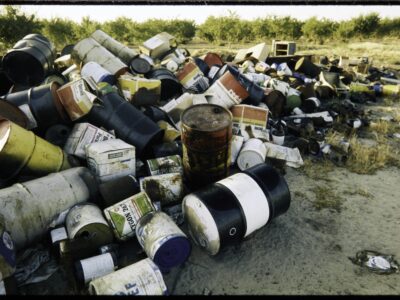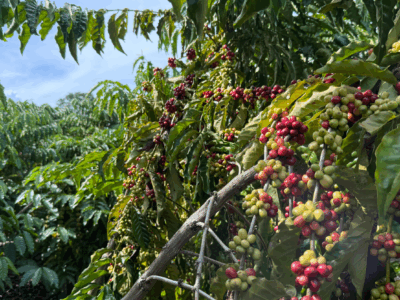Logging, tropical forests, and biodiversity — what we don’t know
Cross-posted at The Berkeley Blog.
A new paper in Conservation Biology (subscription required) from researchers at UC Berkeley and elsewhere provides an important reminder that we often don’t know as much as we think we do about ecological systems and the effects of human actions on those systems. Lead author Benjamin Ramage and colleagues evaluated all the studies they could find in the peer-reviewed literature for a ten-year period that made claims about the effects of logging in tropical forests on biodiversity. The conventional story, of course, is that logging in these forests drastically reduces biodiversity. But Ramage et al. show that conclusion doesn’t necessarily follow from the available data. It turns out that there is substantial spatial variation in species composition in tropical forests, even over fairly small distances. Unless that variation is accounted for, either by baseline studies or by designing treatments so that logged areas are geographically interspersed with unlogged ones, it is impossible to know what to make of data finding differences in species diversity or composition between logged and unlogged sites. Those differences might have been there before logging, rather than being produced by logging. Ramage et al. find that “the probability of falsely inferring a treatment effect was as high as 0.45,” in other words that nearly half of the observed effects reported in the literature might be false positives.
They conclude that the possibility of false positives makes it especially difficult to interpret the inconsistent results in the literature from studies of selective logging, and that the resulting confusion and misinterpretation has inhibited useful learning and may have diverted policy efforts from the most effective paths:
Although the effects of intensive logging are relatively clear, the purported effects of selective logging (and other forms of minor to moderate habitat disturbance) are inconsistent in tropical forests. . . . [C]ollectively [the existing data] are exactly what should be expected given preexisting spatial variation, routine simple pseudoreplication, and no effects of selective logging. This argument in no way proves the absence of real logging effects; however, it does suggest that the compositional effects of logging have been exaggerated and demonstrates that the current body of literature provides little indication of the true nature of these effects. . . .
[Confusion in the literature] has likely inhibited widespread recognition of the conservation potential of tropical production forests. If more accurate knowledge had been available, efforts to stop all logging in tropical forests may have been reduced, allowing for a greater proportion of tropical conservation funds to focus on other objectives (e.g., preventing deforestation and developing strategies that optimally balance ecological concerns and economic pressures). Furthermore, by failing to isolate treatment effects, results of pseudoreplicated studies provide little guidance on the specific logging practices that best maintain communities characteristic of primary forests.
I take two key lessons from this study. First, the science community needs to better practice its institutional norm of skepticism in order to take advantage of its claimed ability to self-correct and learn over time. As the authors of this study acknowledge, it can be exceedingly difficult to do ideal studies of the effects of human interventions, like logging, on ecosystems. Baseline data are often not available, and the costs in time and money of performing carefully replicated experiments may make them infeasible. Necessarily, researchers are often following in the wake of logging and other impacts. But they need to be much more aware of possible confounding effects, and much more on the lookout for ways to deal with those effects or at least ways that those effects might undermine conclusions. Unless the scientific community notices the shortcomings of such studies, it can’t correct them.
Second, both the scientific and the policy community can be misled by the implicit assumption that all human intervention in nature is highly problematic. That assumption may lead us to see the available choices in too stark a light — in the tropical forest context, either we leave primary forest or we log intensively. It may be that there are other choices, that selective logging or carefully managed production forestry may be compatible with maintenance of relatively high levels of biodiversity. That’s not to say that we should always choose working landscapes, just that we should better understand both the costs and the benefits of a full range of landscape management choices.
Reader Comments
6 Replies to “Logging, tropical forests, and biodiversity — what we don’t know”
Comments are closed.







Interesting article! But would you think it makes sense to log selectively in the remaining primary forest or would you see more of a large potential in the secondary forests you could plant there?
Interesting article! But would you think it makes sense to log selectively in the remaining primary forest or would you see more of a large potential in the secondary forests you could plant there?
Reblogged this on ifemgeass and commented:
Found this interesting article about logging and biodiversity in tropical forests! Reminds me of Germany – even though beech forests are the native forests they don’t necessarily show the highest biodiversity depending where you are (like in a climax state). Great potential to integrate forestry with nature conservation!
Reblogged this on ifemgeass and commented:
Found this interesting article about logging and biodiversity in tropical forests! Reminds me of Germany – even though beech forests are the native forests they don’t necessarily show the highest biodiversity depending where you are (like in a climax state). Great potential to integrate forestry with nature conservation!